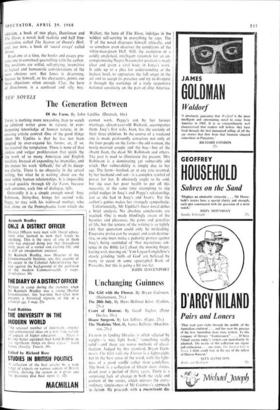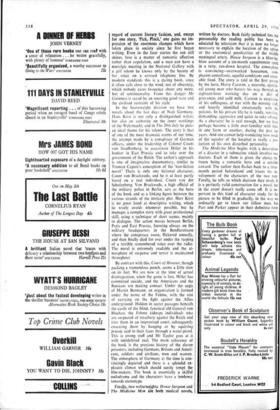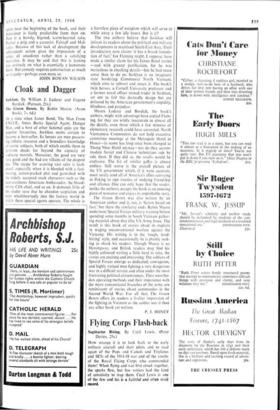Unchanging Guinness
FICTION in lending libraries is often selected by weight—'a nice light book,' something really solid'—and there are worse methods of classi- fication. Judged by this standard, Bryan Guin- ness's The Girl with the Flower is a lightweight, but in the best sense of the word, with the light- ness of a good soufflé rather than candyfloss. The book is a collection of fifteen short stories, dated over a period of thirty years. There is a surprising lack of change in both the style and content of the stories, which mirrors the extra- ordinary timelessness of Mr Guinness's approach to fiction. He proceeds with a magnificent dis- regard of current literary fashion, and, except for one story, 'Pick, Plock,' one gains no im- pression of the enormous changes which have taken place in society since he first began writing. Even in the later stories the sun still shines, love is a matter of romantic affection rather than copulation, and a man can have a nostalgic meeting in the National Gallery with a girl whom he knows only by the beauty of her voice on a crossed telephone line. By modern standards this is a daring book, since it often sails close to the wind, not of obscenity, which nobody cares twopence about any more, but of sentimentality. From this danger Mr Guinness is saved by an unerring good taste and the civilised restraint of his style.
In the heavyweight division we have two novels about the last days of Nazi Germany. Hans Kirst is not only a distinguished writer, but also an authority on the inner workings of the Wehrmacht, and in The 20th July he picks an ideal theme for his talents. The story is that of one of the most dramatic events of our time, the attempt made by a conspiracy of German officers, under the leadership of Colonel Count von Stauffenberg, to assassinate Hitler in his bunker in East Prussia and to take over the government of the Reich. The author's approach is one of imaginative documentary, similar to Truman Capote's conception of the 'non-fiction novel.' There is only one fictional character, Count von Brackwede, and he is at least partly based on a real individual, Count von der Schulenburg. Von Brackwede, a high official of the military police in Berlin, acts as the hero of the book and as a linking figure between the various strands of the intricate plot. Herr Kirst is no great hand at descriptive writing, which he wisely avoids whenever possible, but he manages a complex story with great professional skill, using a technique of short scenes, mainly in dialogue. The action moves between Berlin, Paris and East Prussia, focusing always on the military headquarters in the Bendlerstrasse where the conspiracy arose, flickered uneasily, and then finally died for ever under the rasping of a terrible remembered voice over the radio. The novel is extremely readable and the at- mosphere of suspense and terror is maintained throughout.
By contrast with this, Court of Honour, though packing a tremendous punch, seems a little slow on its feet. We are now at the time of actual disintegration, when the game is lost, Hitler has committed suicide, and the Americans and the Russians are making contact. Under the aegis of Martin Bormann, an organisation is formed under the name of the Fehme, with the aim of carrying on the fight against the Allies underground. Hidden in secret passages beneath the castle of the blind, fanatical old General von Bluchau, the Fehme kidnaps individuals who are suspected of treachery against the Reich and tries them in an improvised court, subsequently executing them by hanging or by squirting prussic acid in their faces through a water-pistol. This is strong stuff and Mr Taylor goes at it with uninhibited zeal. The main substance of the book is the previous history of the eleven prisoners, including Germans, Britons and Ameri- cans, soldiers and civilians, men and women. The atmosphere of Germany at the time is con- vincingly depicted and there is a splendid ex- plosive climax which should surely tempt the film-makers. The book is essentially a skilful melodrama and the characters have a tendency towards stereotype.
Finally, two welterweights. House Surgeon and The Medicine Men are both medical novels, written by doctors. Both fairly technical too, but presumably the reading public has been so educated by television that it is now no longer necessary to explain the location of the spleen or the anatomical peculiarities of the middle meningeal artery. House Surgeon is a blow-by. blow account of a six-month appointment spent in a tatty, run-down hospital. The atmosphere is convincing—overworked housemen, coin. placent consultants, squalid conditions and uneat- able food. The story is told in the first person by the hero, Harry Carston, a neurotic, egotisti- cal young man who batters his way through an eighteen-hour working day on a diet of grievances and cold milk. Carston is suspicious of his colleagues, at war with the nursing staff, and heavily identified emotionally with his patients. In his private life he is randy, sensitive, demanding. aggressive and quick to take offence. As a character he is real enough, but we have perhaps become a little over-familiar with him, in one form or another, during the past ten years. And one cannot help wondering how much of the squalor of the hospital is really a pro- jection of his own disturbed personality.
The Medicine Men begins with a description of a disaster in a submarine which involves two doctors. Each of them is given the choice be- tween being a romantic hero and a sensible coward. The author then flashes back to a three- month period beforehand and traces the de- velopment of the characters of the two men. Finally, he tells us which decision they made. It is a perfectly valid construction for a novel, but in the event doesn't really come off. It is im- portant in this kind of character study for the picture to be filled in gradually, in the way we ordinarily get to know our fellow men, but Parr and Parker appear in their definitive form
quite near the beginning of the book, and their behaviour is fairly predictable from then on. Parr is a bawdy, bigoted, warm-hearted rake, Parker a prig and a careerist. Falstaff and Mal- volio. Because of this lack of development the subsequent action gives the impression of a series of anecdotes rather than a satisfying narrative. It may be said that this is leaning too seriously on what is essentially a humorous book. But comedy requires construction as much as tragedy—perhaps even more so.
JOHN ROWAN WILSON












































 Previous page
Previous page